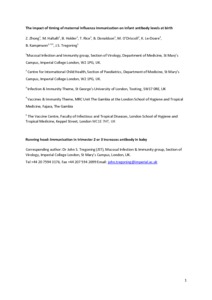Zhong, Z; Haltalli, M; Holder, B; Rice, T; Donaldson, B; O'Driscoll, M; Le-Doare, K; Kampmann, B; Tregoning, JS
(2019)
The impact of timing of maternal influenza immunization on infant antibody levels at birth.
Clin Exp Immunol, 195 (2).
pp. 139-152.
ISSN 1365-2249
https://doi.org/10.1111/cei.13234
SGUL Authors: Le Doare, Kirsty
![[img]](https://openaccess.sgul.ac.uk/110389/1.hassmallThumbnailVersion/Final%20submitted.pdf)  Preview |
|
PDF
Accepted Version
Available under License ["licenses_description_publisher" not defined].
Download (1MB)
| Preview
|
Abstract
Pregnant women and infants are at an increased risk of severe disease after influenza infection. Maternal immunization is a potent tool to protect both these at‐risk groups. While the primary aim of maternal influenza vaccination is to protect the mother, a secondary benefit is the transfer of protective antibodies to the infant. A recent study using the tetanus, diphtheria and acellular pertussis (Tdap) vaccine indicated that children born to mothers immunized in the second trimester of pregnancy had the highest antibody titres compared to children immunized in the third trimester. The aim of the current study was to investigate how the timing of maternal influenza immunization impacts infant antibody levels at birth. Antibody titres were assessed in maternal and cord blood samples by both immunoglobulin (Ig)G‐binding enzyme‐linked immunosorbent assay (ELISA) and haemagglutination inhibition assay (HAI). Antibody titres to the H1N1 component were significantly higher in infants born to mothers vaccinated in either the second or third trimesters than infants born to unvaccinated mothers. HAI levels in the infant were significantly lower when maternal immunization was performed less than 4 weeks before birth. These studies confirm that immunization during pregnancy increases the antibody titre in infants. Importantly, antibody levels in cord blood were significantly higher when the mother was vaccinated in either trimesters 2 or 3, although titres were significantly lower if the mother was immunized less than 4 weeks before birth. Based on these data, seasonal influenza vaccination should continue to be given in pregnancy as soon as it becomes available.
| Item Type: |
Article
|
| Additional Information: |
This is the peer reviewed version of the following article: Zhong, Z. , Haltalli, M. , Holder, B. , Rice, T. , Donaldson, B. , O’Driscoll, M. , Le‐Doare, K. , Kampmann, B. and Tregoning, J. S. (2019), The impact of timing of maternal influenza immunization on infant antibody levels at birth. Clin Exp Immunol, 195: 139-152, which has been published in final form at https://doi.org/10.1111/cei.13234. This article may be used for non-commercial purposes in accordance with Wiley Terms and Conditions for Use of Self-Archived Versions. |
| Keywords: |
1107 Immunology, Immunology |
| SGUL Research Institute / Research Centre: |
Academic Structure > Infection and Immunity Research Institute (INII) |
| Journal or Publication Title: |
Clin Exp Immunol |
| ISSN: |
1365-2249 |
| Language: |
eng |
| Publisher License: |
Publisher's own licence |
| PubMed ID: |
30422307 |
| Dates: |
| Date |
Event |
| 2019-01-13 |
Published |
| 2018-12-02 |
Published Online |
| 2018-11-02 |
Accepted |
|
 |
Go to PubMed abstract |
| URI: |
https://openaccess.sgul.ac.uk/id/eprint/110389 |
| Publisher's version: |
https://doi.org/10.1111/cei.13234 |
Statistics
Item downloaded times since 20 Nov 2018.
Actions (login required)
 |
Edit Item |



